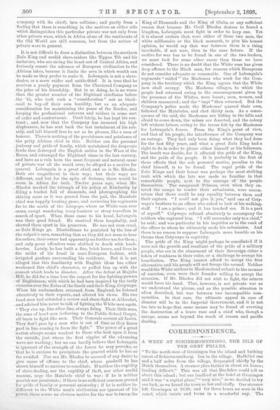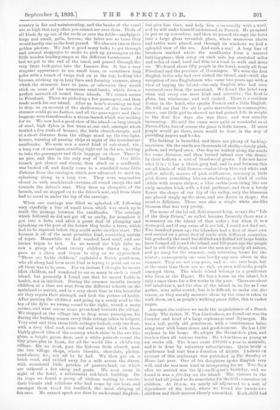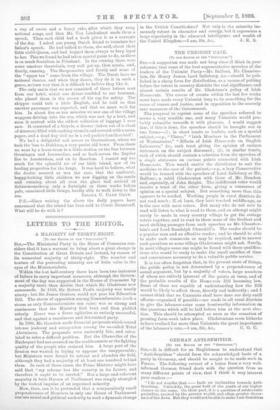CORRESPONDENCE.
A WEEK AT SCHIERMONNIKOOG, THE ISLE OF THE GREY FRIARS.
"To the north-west of Groningen lies the island and bathing resort of Schiermonnikoog. Inn in the village. Ba,dinhel one and a half miles from the village, frequented chiefly by the Dutch themselves. A steamer plies thither in about six hours; landing difficult." This was all that Baedeker could tell us about this island ; but our landlord at the hotel at Groningen said it was "a capital place," " very nice," so we decided to try our luck, as we found the town so hot and stuffy. Oar steamer left Groningen at 10.30, and for three hours we were in the canal, which twists and turns in a wonderful way. The
country is flat and uninteresting, and the banks of the canal are so high that very often you cannot see over them. Birds of all kinds fly up out of the reeds or over the fields—sandpipers large and small, gulls, herons; the latter are so tame they would hardly rise as the boat passed. We also saw two or three golden plovers. We had a good many locks te get through and several stoppages to make to pick up passengers at the little wooden landing-stages at the different farmhouses. At last we got to the end of the canal, and passed through the very large look-gates into the Lauwer Sea. It has a very singular appearance to see small trees, or sometimes long poles with a bunch of twigs tied on at the top, looking like brooms, sticking up in long lines and forming avenues, along which the steamers have to pass, or otherwise they would stick on some of the numerous sand-banks, which form a perfect network all round these islands. We struck across to Friesland. There we picked up a few passengers, and then made north for our island. After an hour's steaming we had to stop, as on account of the shallowness of the water the steamer could go no farther, and all the passengers and their baggage were transferred to a steam-launch which was waiting for us. We now had a good view of the island—a long stretch of sand, high dykes (a few trees at one end, amongst which nestled a few roofs of houses), the little church-steeple, and at a short distance from the village stood up the two light- houses, warning all passing ships at night of the treacherous sandbanks. We soon saw a novel kind of cab-stand, vie., a long row of carriages, standing right out in the sea, waiting to take the passengers and their luggage on shore, Thera is no pier, and this is the only way of landing. Oar little launch got slower and slower, then stuck on a sandbank, was backed off, and finally cams to a standstill some little distance from the carriages, which now advanced to meet us, splashing along in a long row. They were wagonettes closed in with mackintosh curtains all round except the end towards the driver's seat. They drew up alongside of the launch, and we stepped on to the driver's seat, and from there had to crawl in under the top of the carriage.
When our carriage was filled we splashed off, following very carefully a line of small trees, which was stuck up to mark the passage between the sandbanks. The carriage which followed us did not get off so easily, for somehow it got into a hole, and after a great deal of plunging and splashing on the part of the horses they broke a trace, which had to be repaired before they could make another start. The harness is all of the most primitive kind, consisting mainly of ropes. Meanwhile we had reached hard sand, and our horses began to trot. As we neared the high dyke we saw a group of about twenty children drawn up, who gave us a cheer and began to sing as we approached. "Those are feeble children," explained a Dutch geutleman, -who all along had been most kind in trying to point out to us all there was to be seen. For an instant I thought he meant idiot children, and wondered to see so many in such a small island, but presently I found out that he meant feeble in 'health, not in intellect. During the summer months twenty !children at a time are sent from the different schools on the mainland to recruit, and in a very short time in this beautiful air they regain their strength and look the picture of health. After passing the children and going up a sandy road to the top of the dyke we swung round to the right, round a nasty corner, and went across some grass-land towards the village. We stopped at the village inn to drop some passengers, for during the bathing season every little cottage takes in lodgers. 'Very neat and trim these little cottages looked; only one floor, with a deep tiled roof, some red and some tiled with those highly-glazed tiles of the country which shine in the sue like glass, a bright green door, and a white palisade round the tiny grass-plot in front, for all the world like a child's toy village. On we went, past the hideous little church, past the two village shops, where biscuits, chocolate, photos, .sand-shoes, &c., arc all to be had. We then got on a brick road, and rattled away for a mile across the dunes, with occasional little patches of pasture-land, on which are tethered a few sheep and goats. We soon came in sight of the hotel, a substantial red-brick building. On its steps we found a group of visitors waiting to receive their friends and relations who had come by our boat, and • .amongst them stood the landlord, the most obliging of Lis race. He cannot speak nor does he understand English ;
but give him time, and help him oecasionally with a word, sad he will make himself understood in French. He promised to put us up somewhere, and then we passed through the hotel into a large glass verandah place, where numerous chairs and tables were placed, and through its windows we had a. splendid view of the sea. And such a sea! A long line of breakers marked where the sandbanks form a natural bathing-place; then away on each side lay stretched miles and miles of sand, bard and firm as a road to walk and drive on. We found about fifty people in the hotel, nearly all from Friesland and the province of Groningen. We were the first English ladies who had ever visited the island, and—with the exception of two Englishmen who came two years ago with a view of buying the island—the only English who had ever ventured over from the mainland. We found the hotel very clean and every one most kind and attentive ; the food is plain, but wholesome and well cooked. There is a resident doctor in the hotel, who speaks French and a little English. He told me that the air is quite marvellous in consumptive eases; one little girl he showed me had gained 3 lb. in weight in the first five days she was there, and was steadily increasing. He said the cares were quite as wonderful as at Davos-Platz, but of course the place is little known. If more people would go there, more would be done in the way of providing papers and beoks.
The bathing is beautiful, and there are plenty of bathing- machines. On the sands are thousands bf shells,—lovely pink, yellow, and striped ones. One day we walked along the sands for some distance, and then turned inland over the dunee. In their hollows a sort of brushwood grows. I do not know whet it is ; it has a bluish-grey leaf, and in and between this are all kinds of wild flowers—violas (deep blue and white and yellow mimed), masses of pink restharrow, centaury (a little, pink flower something like an everlasting), a kind of orchis (white with mauve stripes), a lilac orchis (something like our early meadow kind, with a faint perfume), and then a lovely flower the shape of our lily of the valley, only the blossoms are ploeced singly up the stem, and are flatter in shape; the scent is delicious, There was also a single white starlike blossom that was very pretty.
The name of the isl t.nd, Schiertnortnleog, means the Isle of the Grey Friars," so called because formerly there was a monastery on the island of that order ; but when it wrs destroyed, and if any ruins of it are left, I could not find out. Two hundred years ego the islanders had a fleet of their own and carried on a great deal of trade with different countries, but gradually the sand has drifted and drifted till large banks have formed all round the island, and 150 years ago the people had to sell their ships, and now the men are nearly all sailors, and go away for the summer, only returning home for the winter ; consequently one sees hardly any men about in the summer. They are not very poor, and n3 one ever begs, but at the same time there are no rich, or even well-to-do, people amongst them. The whole island belongs to a gentleman who lives at the Hague. He has a house on the island, bet only comes there for a few weeks in the year. There arc about 900 inhabitants, and the size of the island is, as far as I can gather, nine miles round ; but it is difficult to make out dis- tances, as they usually measure them by the time it takes to walk them, an I, as people's walking paces differ, this is rather vague.
Amongst the visitors we made the acquaintance of a Dutch family. The father, W. Van Lindenhoot, we found out was the founder and head of a large orphanage near Nymegen. He was a tell, portly old gentleman, with a countenance brim- ming over with benevolence and good-hamour. He hes 1,100 oxphans in his home. Ile adopts Dr. Barna,rdo's plan, and teaches them all various trades. Ile t ikes them as young as six weeks old. The home costs 210,000 a year to Maintair, and it is done by voluntary subscriptions. Quite lately a gentleman had sent him a donation of 28,000. I believe en account of this orphanage was published in The Sunday at Rome last year. One of his daughters spoke English very well, and she was most kind in interpreting for us. Two daj after we arrived was the Qa.ten-R2gent'a birthday, and we found it was a filte-day on the island. The visitors in the hotel had all joined to do somethine for the little convaleso ant children, At 10 a.m. we nearly all adjourned to a sort of eMpendance of the hotel, where we found the tweuty-to children and their matron already assembled. Rich child had a cup of cocoa and a fancy cake, after which they sang national songs, and then Mr. Van Lindenhoot made them a speech. Then each child had a book given it as a souvenir of the day. I asked our young Dutch friend to translate her father's speech. He had talked to them, she said, about their little child-Queen, and had begged them always to keep loyal to her. This we found he had taken special pains to do, as there is so much Socialism in Friesland. In the evening there were some amateur theatricals, very well got up, then music, and, finally, dancing. The Burgomaitre and family and some of the "upper ten" came from the village. The Dutch have no national deuces, and when they dance, they do it in such a grave, so!emn way that it is difficult to believe they like it.
The only mails that we saw consisted of three letters sent from our hotel, which our driver confided to our boatman, who placed them in the crown of his cap for safety. The skipper could talk a little English, and he told us that another passenger was expected, and that we must wait for him. In about five or ten minutes we saw one of the village waggons driving into the sea, which was met by a boat, and soon it arrived with the oddest collection of luggage I ever saw. It consisted of a bicycle, a drawer (taken out of a chest of drawers) filled with cooking utensils and covered with a news- paper, and a dead dog tied up in a red pocket-handkerchief !
We had a delightful sail across to Oostmahorn, where we took the 'bus to Dukkum, a very quaint old town. From there we went by a horse-tram to a little station on the line between G-roningen and Leewardine, and so back across the Zuyder Zee to Amsterdam, and on to l]:a,arlem. I cannot say too much for the splendid air of our little island, nor of its healing properties for the lunge. It was hard to believe, what the doctor assured us was the case, that the sunburnt, happy-looking little children we saw digging on the sands and running about all over the place had arrived at Schiermonnikoog only a fortnight or three weeks before pale, emaciated little things, hardly able to walk down to the sea. SELINA 0. CARE GLYN. M.—Since writing the above the daily papers have announced that the island has been sold to Count Bernstorlf. What will he do with it ?




































 Previous page
Previous page